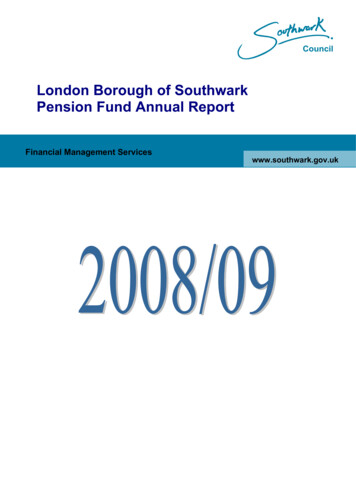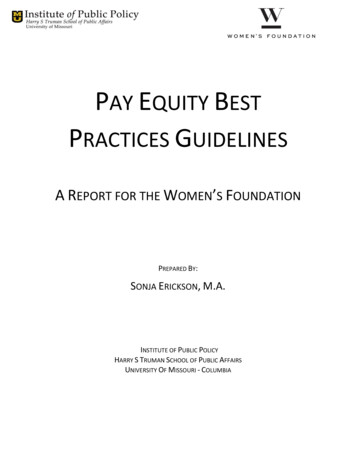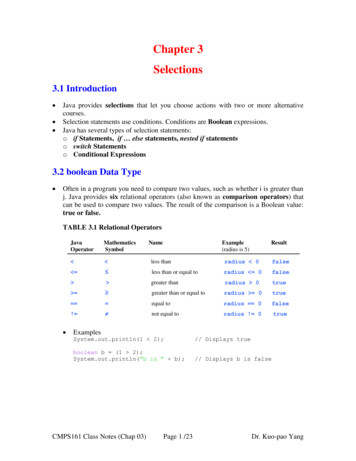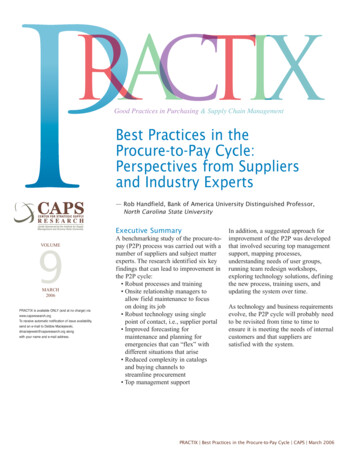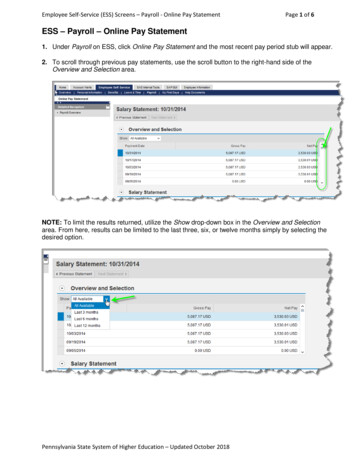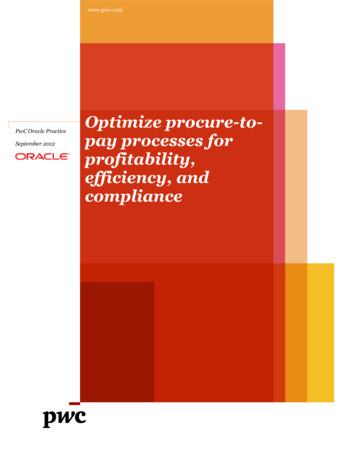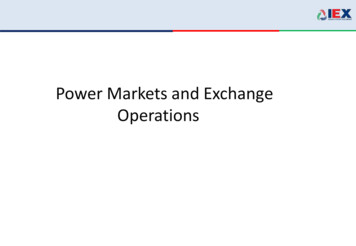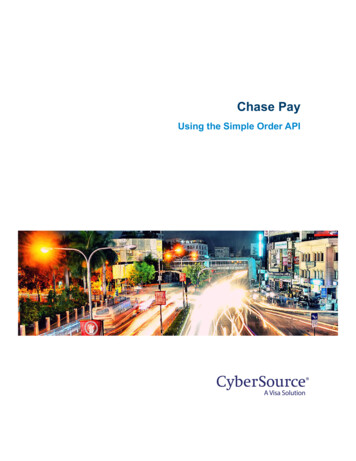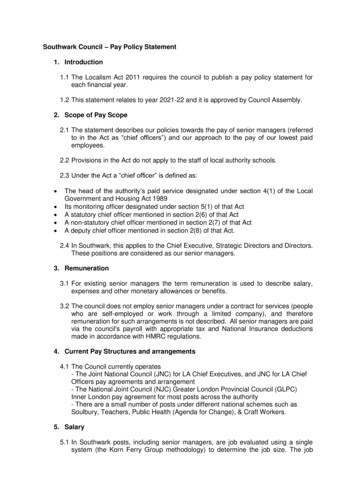
Transcription
Southwark Council – Pay Policy Statement1. Introduction1.1 The Localism Act 2011 requires the council to publish a pay policy statement foreach financial year.1.2 This statement relates to year 2021-22 and it is approved by Council Assembly.2. Scope of Pay Scope2.1 The statement describes our policies towards the pay of senior managers (referredto in the Act as “chief officers”) and our approach to the pay of our lowest paidemployees.2.2 Provisions in the Act do not apply to the staff of local authority schools.2.3 Under the Act a “chief officer” is defined as: The head of the authority’s paid service designated under section 4(1) of the LocalGovernment and Housing Act 1989Its monitoring officer designated under section 5(1) of that ActA statutory chief officer mentioned in section 2(6) of that ActA non-statutory chief officer mentioned in section 2(7) of that ActA deputy chief officer mentioned in section 2(8) of that Act.2.4 In Southwark, this applies to the Chief Executive, Strategic Directors and Directors.These positions are considered as our senior managers.3. Remuneration3.1 For existing senior managers the term remuneration is used to describe salary,expenses and other monetary allowances or benefits.3.2 The council does not employ senior managers under a contract for services (peoplewho are self-employed or work through a limited company), and thereforeremuneration for such arrangements is not described. All senior managers are paidvia the council's payroll with appropriate tax and National Insurance deductionsmade in accordance with HMRC regulations.4. Current Pay Structures and arrangements4.1 The Council currently operates- The Joint National Council (JNC) for LA Chief Executives, and JNC for LA ChiefOfficers pay agreements and arrangement- The National Joint Council (NJC) Greater London Provincial Council (GLPC)Inner London pay agreement for most posts across the authority- There are a small number of posts under different national schemes such asSoulbury, Teachers, Public Health (Agenda for Change), & Craft Workers.5. Salary5.1 In Southwark posts, including senior managers, are job evaluated using a singlesystem (the Korn Ferry Group methodology) to determine the job size. The job
evaluation results for senior managers are verified by independent experts at theKorn Ferry Group.5.2 The job size determines a job’s placement against the pay spine, through anestablished grading structure.5.3 Grades are linked to the salary scale. Staff have the potential to move through thegrade by incremental progression, based on performance.5.4 The pay spine is increased in accordance with pay award settlements determinedby the National Joint Council for Local Authorities Services (and regionally varied forinner London by the GLPC) (or other national negotiating bodies where relevant forother terms and conditions).5.5 The Greater London Provincial Council introduced new pay spines that took effectfrom 1 April 2019. As the council moved away from the standard GLPC grades in1999 and introduced a Southwark specific grading structure, an interim gradingstructure based around the GLPC pay spine is currently in place. A review of theCouncil’s grading structure is due to be undertaken by the organization. Thisapproach is supported by our recognised trade unions.5.6 Southwark has introduced special arrangements for its lowest paid workers, asdescribed below. Where there are any amendments, which are determined by theNational Joint Council for Local Authorities Services as regionally varied by theGLPC, these will be applied to all relevant employees without further referral tocouncil assembly.5.7 Individual staff are paid within the grade. Employees may move through the graderange by incremental progression; in accordance with a performance managementframework.5.8 There is an element of flexibility that allows the payment of non-consolidated marketfactor supplements to specific roles that are recognised as “hard to fill”. Payment issubject to justification against external data and with periodic review.5.9 For posts at JNC level (grade 14 and above), specific benefits up to a financial capmay be taken in kind (e.g. season ticket purchase, addition pension contributions,health plan) or paid as an addition to salary. For senior managers the annualfinancial value of such benefits currently ranges from 2,724 up to 6,190,dependent on grade.6. Other Payments & Expenses6.1 With the exception of standby payments made to a limited number of posts, noadditional allowances are paid to senior managers (as defined in section 2 above).6.2 Senior managers are not eligible to receive overtime for excess hours worked. Inline with all other (non-teaching) staff their full time equivalent weekly hours are 36.However, for senior managers the contract of employment states this as a minimumand individuals are required to do whatever hours are necessary to get the job done,with no additional payment. Where hours are worked outside “normal office hours”;senior managers do not receive enhancements nor shift allowances which other staffon NJC conditions for Local Authorities Services may be entitled.
6.3 Senior managers do not receive an expenses allowance. In line with all other staff,where essential expenses are incurred in the performance of their duties, costs canbe reclaimed, where these are reasonable and public money is being usedprudently.6.4 For non-senior managers, appropriate terms and conditions, e.g. shift allowances,reflect the duties and obligations of posts in accordance with the NJC for LocalAuthorities Services. Bonus payments are only a feature of a small number of CraftWorker terms and conditions (currently under review subject to ballot withrecognized trade unions) – otherwise bonus payments are not a feature of payarrangements. Staff are contracted to work 36 hours per week (full time equivalent).Where service provision demands that it is necessary for additional hours to beworked above the full time equivalent, overtime rates would apply. Rates aredetermined in accordance with Conditions of Service.7. Fees for election duties7.1 Council staff can be employed by the Returning Officer on election duties ofvarying types. The fees paid to Council employees for undertaking these electionduties differ according to the type of election they participate in and the nature ofthe duties they undertake.7.2 Returning Officer duties (and those of deputy returning officers) are contractualrequirements and fees paid to them for national elections/referendums are paid inaccordance with the appropriate Statutory Fees and Charges Order and are paidby the body responsible for the conduct of the election.8. Recruitment of Senior Managers8.1 Vacant senior management positions are recruited to in accordance with thecouncil’s recruitment policy with the overarching aim of employing on merit; toengage the best person for the job.8.2 Senior Managers joining the organisation:– Are paid on the grade for their post.Join at the bottom spinal column point of the grade; unless the person can demonstratethat payment above the minimum is essential to match current earnings, or to reflectthe prevailing market, or to recognise experience and skills to secure engagement. Nostaff are paid above the grade maximum.Do not receive any lump sum payments on joining.May receive expenses relating to their home relocation where this is necessary tosecure engagement.8.3 Members have the opportunity to question all salary packages to be offered as partof the recruitment to senior management posts.9. Leaving the Organisation & Pensioners9.1 All staff leaving the council (including senior managers) on a voluntary resignationbasis do not receive a severance payment.
9.2 Where the council decides to terminate any employee’s service on the basis ofredundancy, in employment law terms this is based on the facts of the case,(deletion or diminution of the post). Payment entitlements are enshrined in thecouncil policy on redeployment redundancy and reorganisation and comprisecontractual entitlements, (notice un-worked, leave not taken), plus redundancyelement, in accordance with the statutory table. Payments are made as a multipleof an actual week’s pay. Also for those aged 55 and over, under the pensionregulations they become entitled to immediate pension as earned in the event ofredundancy or efficiency; any costs accruing to the Council for pension paymentsare capital costs based on an actuarial calculation linked to service and age.Entitlements are not discretionary to an individual once a redundancy situationarises.9.3 For senior managers, where redundancy or mutual termination occurs informationwould be included in the declared salary data included in the Statement of Accountseach year. Were an employee’s services to be terminated on these bases thecouncil would not re-engage the individual on a contract for services (i.e. selfemployed basis).9.4 Where the Council decides to terminate any employee’s service on the basis ofmutual termination on efficiency of the service grounds, the Council calculatesentitlements relying on the Local Government (Early Termination of Employment)(Discretionary Compensation) (England and Wales) Regulations 2006 and thepension regulation when over 55 years old. Should the cost of the total packageexceed 100k, agreement will be obtained via council assembly or another properlyconstituted Member body, prior to finalization.9.5 New recruits may be in receipt of a pension under the Local Government PensionScheme (LGPS) e.g. as a result of service with another Authority. In such cases,the employee’s pension entitlement would be abated (reduced in accordance withactuarial calculation) or capped as required under LGPS regulations. This wouldhave no impact on the council’s remuneration arrangements.9.6 Under the LGPS Regulations eligible employees may be considered for one of theScheme’s flexible retirement options. This would include instances where theemployee reduces to a part time basis or demotion. On such occasions the council’sremuneration arrangements would continue as described above plus any pensionpayable determined by application of LGPS Regulations and that person’smembership entitlements.10. Lowest Paid Staff10.1The Council maintains a strong commitment to paying all employees theLondon Living Wage and the Council’s current pay spine incorporates the LondonLiving Wage on all spinal column points – as set by the NJC and varied regionallyby the GLPC.10.2The latest London Living Wage rate was announced in November 2020, as partof “Living Wage” week. The hourly rate was set at 10.85 per hour. This rate isindependently calculated by the Resolution Foundation and overseen by the LivingWage Commission. It is reviewed annually. The Council’s NJC & GLPC minimumrate of pay continues to exceed the current London Living Wage.11. Other Information
11.1In addition to this statement the council publishes other information on the detailof payments. Information can be found on the Open Data section of the council’swebsite (www.Southwark.gov.uk). This includes: The council’s grading structure and salary scales.The annual statement of accounts. This includes the numbers of people earning 50,000 per year or more in 5,000 bandings. The accounts also give detail, includingthe name, for those whose pay is 150,000 or more. This covers all remunerationelements including employer’s pension contribution.11.2In accordance with the Local Government Transparency Code 2015; tocoincide with the reporting at the end of the financial year, the council publishesthe ratio between the highest paid taxable earnings for the given year and themedian earnings figure of the whole of the authority’s workforce. In January 2021the ratio between the top earner and median earnings was 6.03 to 1.
9.2 Where the council decides to terminate any employee's service on the basis of redundancy, in employment law terms this is based on the facts of the case, (deletion or diminution of the post). Payment entitlements are enshrined in the council policy on redeployment redundancy and reorganisation and comprise
